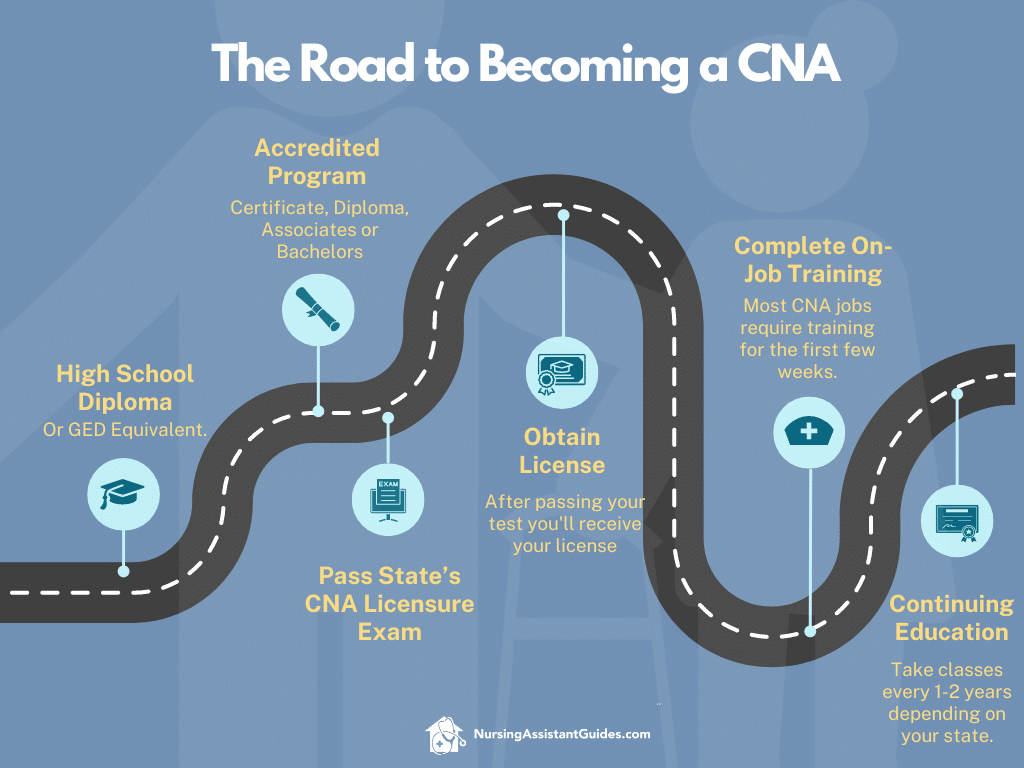
Real Nursing Assistants. Honest Answers.
More Answers From Certified Nursing Assistants
4 Steps To Becoming A CNA
Step 1
Get A CNA Degree
Get a Certificate, Associates, or Bachelors in Nursing Assisting or a related field.
Step 2
Complete a Clinical Rotation
A supervised internship in a healthcare setting.
Step 3
Pass the CNA Certification Exam
Pass your state’s approved CNA certification exam.
Step 4
Obtain Your License
Provide proof of your education, clinical experience, and certification.
Best Online CNA School Programs
There are multiple levels of CNA programs available. The most common is a CNA certificate program, which typically takes about 12 weeks to complete. CNA certification programs are offered at community colleges, vocational schools and via online colleges. There are also associate in nursing assistant degrees, which typically take about two years to complete. Associate degree programs are offered at online colleges, community colleges and some technical schools. Here is a list of accredited online CNA school programs:
Want More Options? See Our Directory of CNA Degree Programs
What Our Experts Say About Online CNA Schools
I got [my CNA certification] when I was sixteen because that was the youngest you could be, and I’m almost twenty seven and I have not regretted a single day. You make so many friends. I’ve influenced so many people. I got to be there for the end of some people’s lives when their families couldn’t be there. For some people, I was all that they had.

You actually can do a big portion of your CNA degree online. Institutions do partner with local facilities because you still have to go do your clinical. It’s all kind of new. You have to really do your due diligence and make sure that you are finding an accredited program.

I have enjoyed it. It’s not been easy. It’s been a lot of work. Hard work doesn’t scare me though, so I would encourage people to do it if they really truly want to help other people, and wanna get into healthcare field for the right reasons and know that it’s work and it’ll be hard, but it’ll be worth it and you’ll learn a lot and just never know what avenue.

CNA School Selection Considerations
What is a Nursing Assistant?
A certified nursing assistant, also known as a CNA or nursing aide, is a healthcare worker who provides basic care to patients in a variety of settings, including hospitals, nursing homes, and assisted living facilities. They may help patients with activities of daily living, such as bathing, dressing, and eating. They may also provide personal care, such as grooming and changing diapers. Nursing assistants also play an important role in providing emotional support to patients and their families.
Nursing assistants typically have a high school diploma or equivalent and have completed a training program that is at least 75 hours long. Some states also require nursing assistants to pass a certification exam.
The duties of a nursing assistant vary depending on the setting, but they may include:
- Bathing, dressing, and grooming patients
- Helping patients with meals and snacks
- Assisting patients with ambulation and transfers
- Measuring and recording vital signs
- Providing skin care
- Changing diapers and bedpans
- Cleaning and maintaining patient rooms
- Communicating with patients and their families
- Reporting changes in patient condition to nurses
Nursing assistants play an important role in the healthcare system. They provide essential care to patients and their families, and they can make a real difference in the lives of others.
Is Licensure Required To Be A CNA?
The short answer – yes, usually. While some states only ask you to finish a CNA program and complete on-the-job training, most states also require you to take the CNA exam. This exam is basically a competency test that consists of multiple choice and open-ended questions.
An accredited, state-approved CNA program is designed to prepare and qualify you for this exam, and you can also take practice tests ahead of time to increase your chances of passing the real thing the first time around.
Nursing Assistant vs. CNA?
A Certified Nursing Assistant (CNA) is simply a nursing assistant who has passed the certification exam, which in some states is a requirement to work.
Once you have completed a nursing assistant program, you will be eligible to take the National Nursing Assistant Assessment Program (NNAAP) exam, or an equivalent exam for your state. Passing the NNAAP exam will allow you to become a certified nursing assistant (CNA).
CNAs work under the supervision of registered nurses (RNs) and licensed practical nurses (LPNs) to provide basic care to patients in a variety of settings, including hospitals, nursing homes, and assisted living facilities. CNAs may perform tasks such as bathing, feeding, dressing, and grooming patients; assisting with mobility; and taking vital signs.
What are the pros of becoming a CNA?
Here are some of the benefits of becoming a certified nursing assistant:
- High demand: CNAs are in high demand, and many employers offer competitive salaries and benefits.
- Flexible hours: CNAs can often find jobs that offer flexible hours, which can be helpful for people who are also students or parents.
- Opportunities for advancement: CNAs can advance their careers by earning additional education and certifications, or by moving into supervisory or management positions.
- Rewarding work: CNAs play an important role in providing care to patients and their families. They can make a real difference in the lives of others.
School Selection Criteria
There are many factors to consider when selecting a CNA school. Some of the most important factors include:
- Accreditation: Make sure the school you choose is accredited by a reputable organization, such as the National League for Nursing Accrediting Commission (NLNAC). This will ensure that the program meets high standards of quality.
- Curriculum: The CNA curriculum should cover the essential topics that you need to know to be a successful nursing assistant, such as anatomy and physiology, patient care, and infection control.
- Faculty: The faculty should be experienced and qualified to teach nursing assistant students. They should be able to provide you with the knowledge and skills you need to be successful in the program and in your career.
- Cost: The cost of the CNA program should be affordable for you. There are many financial aid options available, so be sure to explore all of your options.
- Location: The location of the school should be convenient for you. Consider the distance to the school, the availability of transportation, and the cost of living in the area.
Once you have considered these factors, you can start narrowing down your options for a CNA school. It is a good idea to visit the schools you are considering and meet with the faculty and staff. This will give you a better sense of the program and whether it is a good fit for you.
Here are some additional tips for selecting a school to study nursing assistance:
- Get recommendations from friends, family, or colleagues who have gone through the program.
- Read online reviews of the school and the program.
- Attend an open house or information session to learn more about the program.
- Talk to current students and graduates of the program to get their feedback.
By considering all of these factors, you can make an informed decision about which school is right for you.
Pros and Cons of Campus vs. Online CNA Classes
Online CNA certification and online CNA degree programs have grown tremendously in popularity over the last decade. But is getting a nursing assistant degree online right for you?
Attending a nursing assistant program online has advantages and disadvantages, and how these stack up depends on your learning style and goals. Here are some potential pros and cons of attending a nursing assistant program online and on campus:
Online
Pros
- Flexibility: Online programs allow you to learn at your own pace and on your own time. This can be a great option for people who have busy schedules or who live far from a campus.
- Convenience: Online CNA programs can be completed from anywhere with an internet connection. This can save you time and money on transportation and accommodation.
- Cost: Online CNA degree programs can be more affordable than on-campus programs. This is because you do not have to pay for things like housing and food.
- Access to resources: Online CNA classes often offer access to a wide range of resources, such as online libraries, discussion boards, and tutoring. This can help you to succeed in your studies.
Cons
- Isolation: Online CNA classes can be isolating, as you will not be able to interact with your classmates in person. This can make it difficult to build relationships and get support.
- Distractions: It can be difficult to stay focused when learning online, as there are many distractions at home. You will need to be disciplined and motivated to succeed in an online CNA program.
- Technology: You will need to have a good understanding of technology in order to succeed in an online program. You will need to be able to use computers, tablets, and other devices to access your coursework and communicate with your classmates and instructors.
On-campus
Pros
- Interaction: On-campus CNA programs allow you to interact with your classmates and instructors in person. This can help you to build relationships, get support, and learn more effectively.
- Resources: On-campus certified nursing assistant degree programs often have access to a wider range of resources, such as libraries, laboratories, and clinical facilities. This can help you to succeed in your studies.
- Networking: On-campus CNA programs can provide you with opportunities to network with other students, professionals, and employers. This can help you to find a job after graduation.
Cons
- Schedule: On-campus CNA certification programs require you to attend classes at set times. This can be difficult for people who have busy schedules or who live far from campus.
- Cost: On-campus certified nursing assistant programs can be more expensive than online programs. This is because you will have to pay for things like housing and food.
- Time commitment: On-campus CNA degree programs require a significant time commitment. You will need to be prepared to spend a lot of time studying and completing assignments.
Ultimately, the best way to decide whether to study nursing assisting online or on campus is to consider your individual needs and preferences. If you are looking for a flexible and affordable option, then an online program may be a good fit for you. If you are looking for a more interactive and supportive learning environment, then an on-campus program may be a better choice.
Degree Selection
There are several campus and online nursing assistant degree and certificate options, each with different time requirements, prerequisites, and career opportunities. Here are the primary degrees available to become a certified nursing assistant:
- Nursing Assistant Certificate: This is the most common type of CNA degree. It typically takes 75 – 120 hours to complete and covers topics such as anatomy and physiology, patient care, and infection control.
- Nursing Assistant Diploma: This degree is similar to a certificate, but it typically takes longer to complete (120-180 hours) and includes more coursework.
- Associate of Applied Science in Nursing Assistant Technology: This degree is a two-year degree that provides students with a more in-depth education in nursing assistant skills and knowledge.
There are also some campus and online nursing assistant programs that offer non-degree options, such as certificate programs that can be completed in as little as 6 weeks.
Regardless of which CNA degree program you select, to become a certified nursing assistant, you must complete a state-approved training program and pass a competency exam. The specific requirements vary from state to state, so it is important to check with your state’s board of nursing for more information.
What Is The Career Outlook For CNAs?
The job outlook for CNAs can be summarized in one word: excellent. According to The US Bureau of Labor Statistics, employment of nursing assistants is projected to grow 11 percent from 2016 to 2026, faster than the average for all occupations, as of May 2017.
The job growth for CNAs will not be slowing down any time soon. People are living even longer due to medical advancements, contributing to the growing need for more nursing assistants. Our population is also aging at a rapid rate, and with a medical workforce shortage predicted, becoming a CNA is a good idea.
A promising job outlook is strong in other medical professions, such as nursing. If you choose to advance your education and become an RN, you’ll still be highly sought after. Employment of registered nurses is projected to grow 15 percent from 2016 to 2026, MUCH faster than the average for all occupations. Becoming a CNA is a great way to break into the medical industry in a short amount of time.
Career Outlook By State
Employment levels for CNAs vary by state. The US Bureau of Labor Statistics highlights those states with the highest employment level for nursing assistants in the illustration below (source: BLS.gov: Occupational Employment And Wages: Nursing Assistants, data for May 2022).

Can I Become A CNA Online?
Yes, you can become a CNA online. Online CNA schools have grown in recent years and offer an enormous amount of flexibility. These online CNA school programs offer the necessary classes for becoming a CNA online.
The number of training hours varies by state, AND some states require a combination of classroom hours and clinical hours. Some schools offer hybrid training programs, but ultimately, verify your state’s requirements before choosing a program. Check out our guide, CNA Classes Online, to learn more about becoming a CNA online.
Explore More
Resources
Learn more about CNA Schools, CNA Classes, Salary, and Degree Options by visiting these resources:
Career Resources
- What Is A CNA (Certified Nursing Assistant)?
- Medical Assistant vs. CNA: Differences
- How To Manage Stress As A CNA
- What CNA Classes Are Actually Like
- 3 Biggest Challenges of Being A CNA
- Tips for CNAs To Increase Their Salary
- How to Prepare For A CNA Job Interview
- In-Depth Overview of Online CNA Classes
- How To Study for the CNA Certification Exam
- In-Depth Overview of CNA Practice Tests
- Nursing Assistant Guides Podcast
- Nursing Assistant Guides Blog
Articles
- 125 Online Resources For Hospice and Pallative Care
- 100 Resources for Home Healthcare & Assisted Living
- 50 Open Source Projects That Are Changing Medicine
- 25 Social Media Sites To Improve Your Health
- 50 Healthcare Policy Blogs
- The Impact of Social Media on Healthcare
- 25 Proven Home Remedies and the Science Behind Them
- 25 Childhood Obesity Epidemic Infographics
- 40 Top Medical Career Blogs
- Workplace Violence in Healthcare






